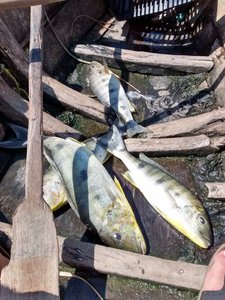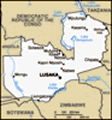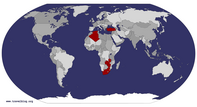Advertisement
Published: June 29th 2015

 Nkupi Fish
Nkupi Fish
Fish being sold in Mpulungu but probaby caught in Tanzanian waters.In short, maybe. I don’t know. Probably not.
I think I need to explain my indecision. One month in Zambia, on the move every couple of days, I reckon I got a pretty good overview of the country. It was by no means comprehensive, but a decent broad-stroke observation. I think I can say with some confidence that Lusaka is far and away the largest urban area in southern, central and northern Zambia but I would be curious to visit the Copperbelt towns of Kitwe and Ndola which have allegedly benefitted from the economic prosperity of that province’s mineral wealth.
On the other hand I have seen only a fraction of the country’s natural heritage. I still have much to see: the National Parks – North and South Luangwa; Kafue; Kasanga etc; dozens of waterfalls (catalogued in no less than two separate volumes in recent years); the beautiful Machinga escarpment which I only glimpsed from afar; swamps and wetlands and the other southern shore of Lake Tanganyika (the more exclusive side).
I still have much to see: the National Parks – North and South Luangwa; Kafue; Kasanga etc; dozens of waterfalls (catalogued in no less than two separate volumes in recent years); the beautiful Machinga escarpment which I only glimpsed from afar; swamps and wetlands and the other southern shore of Lake Tanganyika (the more exclusive side).
I came to Zambia knowing next to nothing about its geography, people, culture, history and flora and fauna. Arguably, I know a whole lot more

 The boat to the other side
The boat to the other side
Packed onto a boat along with a bunch of local commuters crossing the southern lake to Chibwa.now.
I took in a couple of good museums that went somewhere towards plugging the hole in my historical knowledge of the struggle for independence from colonial Britain half a century ago. Also on display were a selection of cultural artefacts and information panels on the nature of the tribal systems, the paramount power invested in the chiefs, and the parallel structures of modern government as initiated by the former ruling powers. I highly recommend a visit to the Moto Moto Museum in Mbala, packed with eclectic items collected by a French Canadian priest in the last century. I can’t speak for the Lusaka Museum but the one in Livingstone is reasonably good, if a little bit dated.
The average level of spoken English is surprisingly good which really facilitates communication with your average tourist. The people are generally friendly and approachable as well. There weren’t many places I felt uncomfortable but one of them was Lusaka central market. I think as a Westerner you stick out a bit and with all the comings and goings in the general melee one could be seen as an obvious target for crooks. I was actually warned of this in the
company of a man I’m fairly convinced was a crook himself, which says a lot!
The average level of spoken English is surprisingly good which really facilitates communication with your average tourist.
The other thing which makes visitors of European extract potentially annoyed – speaking for myself – is being refered to repeatedly as a Muzungu. This word is a variation of murungu in Zimbabwe and mulungu in South Africa, all of which translate as ‘white person.’ Coming from the mouths of children is a bit annoying; from adults it can seem derogatory, even racist. I tried in vain to grapple with their meaning, whether implied or explicit, in vain. It wasn’t until I met a Peace Corps worker in Lusaka that I got a new perspective on the issue.
Note: The Peace Corps is a voluntary organisation made up of graduates from the US who live and work on various non-profit projects in the host country for a period of one to two years. This particular volunteer, Graham, had been living in working in the Kapiri Mposhi district a few hours north of Lusaka. His take on the Muzungu question was that it generally was not meant as an insult. As he pointed out so few of them had ever had
any contact of any real significance with white people that it was quite natural for them to categorise ‘us’ generically as whites or muzungus. During his time in Zambia he has countered this by explicitly asking to be called by his given name, asking, rhetorically perhaps, if they would stand for it if he said ‘hey, African’ every time he addressed them. Does that make sense to you? It does to me when I reflect on it. Besides which, according to Graham, Zambians have another word reserved for white people they don’t like: Buga. I ate the Buga fish during my visit to Mishembe beach on the shores of Lake Tanganyika. The fishermen told me that they catch it ‘deep down’ by which I infer the reference to have ‘bottom feeder’ connotations. I never heard it being used in a racial context however.
The other thing which makes visitors of European extract potentially annoyed – speaking for myself – is being refered to repeatedly as a Muzungu...(but) it generally was not meant as an insult.
Zambia has much in common with other sub-Saharan countries in terms of demographics (young but indented by the AIDS epidemic of the previous three decades), Bantu language and culture, and the rural-urban divide. I spoke to a few young Zambian men visiting northern Zambia from Lusaka or the Copperbelt towns. They all commented on

 Wild flower
Wild flower
As photographed en route to Kalambo Falls on foot.the prevalence of a rural economy in the Northern Province. One of them went so far as to say that he wouldn’t be able to relocate there because ‘life was too slow.’ I’m sure many young people in the bigger urban settlements share his perspective. I had a rather memorable conversation with a Zambian man of working age in the town of Mpulungu on the shores of Lake Tanganyika. I was commenting on the amount of plastic refuse in the drains and on the edges of the roads and marketplaces around town. I asked his perspective.
“This is a village country,” he replied, “not like Britain or America,” by which I interpret him as explaining an alternative aesthetic rather than the combined visual-environmental impact that I was implying. The question of what is viewed as unsightly litter versus an acceptable by-product of human settlement is one that dogs me and no doubt many others of similar socio-cultural background. My engaging conversation with Graham yielded some possible explanations: upbringing (lack of pro-active role models), education and cultural values being foremost. Whatever the reasons it needs to be addressed. Plastics in particular are a horrible creation which need not be as

 Kalambo waterfall
Kalambo waterfall
A still of the water as it falls over the lip of the falls into the river gorge, 200 m below.widely used as we do at present, vis-a-vie the plastic bag and other packaging which persists for years after use. I was impressed to learn from one of my American co-travellers that plastic bags have been officially prohibited in the state of Oregon where he lived.
The question of what is viewed as unsightly litter versus an acceptable by-product of human settlement is one that dogs me and no doubt many others of similar socio-cultural background.
As for the situation regarding deforestation I think this is also primarily a case of engaging society and trying to change, or at least modify, existing cultural practices and values. The extensive Miombo woodlands have historically yielded enough wood fuel to satisfy the needs of the towns and villages therein, but population pressures have increased exponentially and the capacity of the woodlands to provision these people has not. It’s intuitively obvious in one respect but investigation and valuation of these woodlands in other regards (ecotourism, commercial wood use, game farming etc) is necessary.
Additionally, anecdotal observation and discussion with other people suggest to me that many of the bird species which inhabit the Miombo (of which there are many endemic species) have been hunted quite intensively. On my various walks I found the birds skittish and largely confined to the upper canopies where they would be more elusive targets for

 Kalambo portrait
Kalambo portrait
Looking downwards to the depths of the gorge.the catapult-wielding village children. As in Zimbabwe hand-made catapults are widespread although I have to admit I have not seen them in use. I defer to the testimony of others, mainly farmers on this matter. Whatever the degree of harvesting/hunting may be I find the concept of killing birds for consumption rather appalling. The average canopy browsing species – hyliotas, batis, shrikes and so-forth – are small and feathery species who would yield very little meat or protein if eaten, but the distinct possibility that this is being done throughout much of the country is reflective of the subsistence economies that exist in much of rural Zambia and elsewhere in southern-central Africa.
In conclusion I have to say I agree with that aspect of development theory which asserts that lifting people from poverty is the best anecdote to many of these practices. The challenge comes in getting people, whether villagers, urbanites or politicians to collectively value these diverse natural resources and derive the collective will to see how they are threatened and want to conserve them, however difficult that might seem at the present time. Like almost every aspect of human endeavour, defining the goals and objectives is the
first step in the complex process we define as ‘progress’.
In conclusion I have to say I agree with that aspect of development theory which asserts that lifting people from poverty is the best anecdote to many of these practices.
It is important, however, to highlight the positive aspects of the country and in the accompanying gallery I hope to share the best of my traverse of the green and well-watered land beyond Mkushi which I covered in a previous post.
Advertisement
Tot: 0.146s; Tpl: 0.013s; cc: 13; qc: 65; dbt: 0.064s; 1; m:domysql w:travelblog (10.17.0.13); sld: 1;
; mem: 1.3mb

























Dancing Dave
David Hooper
Zambia
Thanks for your perspectives Leo of this amazing country. We hear in Oz that it's a food bowl where farmers are encouraged to take up the slack caused by Zim's demise. Did you see evidence of that? In Lusake when we were there, I was taken by its modern shopping centres and general prosperity. This was particularly so as we stayed near the consular district to access the British High Commission after the cook on our safari stole my passport and money. That area was affluent indeed. Throughout Zambia we found the people quite hassle free of tourists which was a welcome change from Kenya, Tanzania and Malawi. You sound as if you enjoyed your time there.